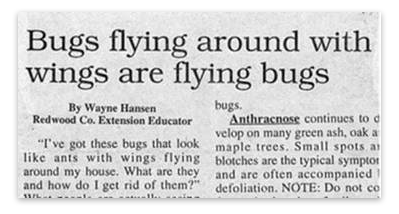|
Welcome to your GrammarBook.com e-newsletter.
|
“Thank you for your lessons and quizzes. They will help me pass my school and job tests.”
—Dana W.
“You folks provide a great resource with your GrammarBook.com website and the weekly
e-newsletters. Keep up the good work!”
—Don F.
“I would just like to thank you for your weekly
e-newsletters. They are always so helpful!”
—Rae G.
|
|
|
Words in Flux
Today we’ll discuss two words whose meanings in casual conversation may vary significantly from their traditional meanings in formal writing.
Despise
Not so long ago, despise was more than just another word for detest. “Syme despised him and slightly disliked him,” wrote
George Orwell in his 1949 novel 1984. Orwell knew that, strictly speaking, despise means “to look down on” but not
necessarily “to dislike” (although that’s usually part of the deal).
“Let no one despise your youth” reads a line in the Bible (1 Timothy 4:12). Note that “despise your youth” does
not mean “hate you for being young.” The passage means, “Don’t let anyone disrespect or disregard you for being young.”
Disdain is not the same as downright hostility.
Affinity
Some seven hundred years ago, affinity meant “relation by marriage.” By extension, the proper use of affinity involves
mutuality. But that sense of mutual attraction is often absent in contemporary uses of affinity. An online search reveals many examples such as
these: “She always had an affinity for growing fruit.” “I have an affinity for vintage chairs.”
“My friend has an affinity for making things out of cardboard.” In these examples, “growing fruit,” “vintage
chairs,” and “making things out of cardboard” are passive elements, not active components in a relationship. Better to say “a talent for growing fruit,” “a fondness for vintage chairs,” “a flair for making things out of cardboard.”
In the examples above, affinity is followed by the preposition for. But in formal English, the phrase affinity for is
despised. The editor Theodore M. Bernstein advised writers to “discard for” and instead “use between, with, or sometimes to.”
Here are three sentences that use affinity correctly: “There is an affinity between the Irish and the Italians that can be
hard to explain.” “Some people have a natural affinity with children.” “Two vaccines containing native proteins with
affinity to porcine transferrin were tested.”
There is no affinity unless it is shared by both parties.
Because of the e-newsletter’s large readership, please submit your English usage questions through GrammarBook.com’s “Grammar Blog.” |
|
Pop Quiz
Are these sentences all right? Do any need fixing? Suggested answers are below.
1. She has some affinity for math.
2. This is a politician with an affinity for making headlines.
3. I knew she always despised me, but I didn’t realize she detested me.
Free BONUS Quiz for You!
[[firstname]], because you are a subscriber to the newsletter, you get access to one of the Subscription Members-Only Quizzes. Click here to take a Confusing Verbs Quiz and get your scores and explanations instantly!
Good News for Quiz Subscribers
First, we are excited to inform our instructor-level quiz subscribers of several significant improvements to your subscription at no added cost to you:
- You may opt out of receiving e-mails when students complete quizzes.
- You may now assign multiple quizzes at a time.
- You may now assign a starting date and ending date when quizzes will be available to students.
- You can now download a spreadsheet containing the results of all quizzes taken by each student.
Second, after logging on, all quiz subscribers may now enjoy GrammarBook.com free of advertisements (excluding the Grammar Blog).

“So convenient … hundreds of quizzes in one click.”
[[firstname]], Subscribe to receive hundreds of English usage quizzes not found anywhere else!
- Take the quizzes online or download and copy them.
- Get scored instantly.
- Find explanations for every quiz answer.
- Reproduce the quizzes to your heart’s content.
- EASY to use.
- No software to download.
- No setup time.
- A real person to help you if you have any questions!
“Fun to test my skills!”
“The explanations really help … thanks!”
Your choice: Subscribe at the $29.95 or $99.95 level ($30 off - regularly $129.95).
“I download the quizzes for my students who don’t have computer access.”
Subscribe today to receive hundreds of English usage quizzes not found anywhere else!
“Makes learning English FUN!”
 |
Don’t need all the quizzes at once?
You can now purchase the same quizzes individually for ONLY 99¢ each. Purchase yours here. |

Get Yours Today!
Get Amazon’s No. 1 Best-seller in Four Categories!
No. 1 in Grammar
No. 1 in Reading
No. 1 in Lesson Planning
No. 1 in Vocabulary |
The Blue Book of Grammar
and Punctuation
by Jane Straus, Lester Kaufman, and Tom Stern
The Authority on English Grammar!
Eleventh Edition Now Available
Have You Ordered Your Copy Yet?
An indispensable tool for busy professionals, teachers, students, homeschool families, editors, writers, and proofreaders.
Available in print AND as an e-Book! Over 2,000 copies are purchased every month!
Order Your Copy Today!
- Hundreds of Grammar, Punctuation, Capitalization, and Usage Rules
- Real-World Examples
- Spelling / Vocabulary / Confusing Words
- Quizzes with Answers
The publisher is extending its pre-publication discount offer until April 30, 2015! If you live in the United States or Canada, order the new edition of The Blue Book
through Wiley.com and get 30 percent off and FREE shipping. Simply go to bit.ly/1996hkA and use discount code E9X4AYY.
For those of you who live outside the U.S. and Canada, although the publisher is not able to offer free shipping, you will get 35 percent off to help offset your shipping costs. Simply go to bit.ly/1996hkA and use discount code E9X4A. |
Wordplay
If these newspaper headlines found circulating the Internet are authentic, they surely demonstrate an absence of thoughtful editing.


Pop Quiz Answers
1. She has some talent for math.
2. This is a politician with a gift for making headlines.
3. I knew she always despised me, but I didn’t realize she detested me. CORRECT
Learn all about who and whom, affect and effect, subjects and verbs, adjectives and adverbs, commas, semicolons, quotation marks, and much more by just sitting back and enjoying these easy-to-follow lessons. Tell your colleagues (and boss), children, teachers, and friends. Click here to watch. |







